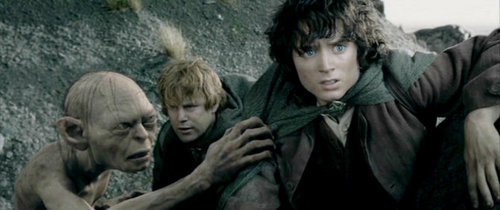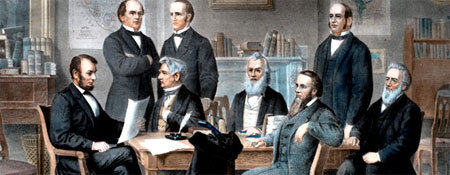Frodo Baggins and Abraham Lincoln

I will never forget my first reading of the Lord of the Rings. I loved Tolkien’s characters, especially Frodo and Samwise Gamgee. Although Frodo and Sam loved each other deeply, they did not always agree – especially about how to deal with Gollum – the obvious antagonist in the story. Sam was at times ready to kill Gollum. I found myself agreeing with Sam. Gollum was evil but it was because the Ring possessed him. Understanding the power of addiction in my own life, I sometimes felt compassion for Gollum. Frodo, on the other hand, in spite of his frustrations with Gollum, almost always showed mercy and compassion on the pitiful scoundrel. In the end of the story, we discover that Gollum has a role to play and that mercy and kindness triumphs over cruelty and judgment. But none of us knows the end of the story in advance.
In Team of Rivals[1], Doris Kearns Goodwin projects us into the minds and souls of Abraham Lincoln and his Cabinet. I saw many parallels between Frodo and Lincoln in reading this incredible biography, especially in the areas of patience and compassion. On many occasions Lincoln had good reason to dismiss his Cabinet members and generals, but again and again he withheld both judgment and punitive action. I was continually amazed at this President’s greatness and goodness.

After being elected the sixteenth president of the United States, Abraham Lincoln turned to the task of choosing his Cabinet. In this terribly important and dangerous time for the Union, he had to choose carefully and wisely. Surprisingly, his appointments included three of the men who had run against him in the 1860 presidential race. Lincoln’s first appointment was for the position of Secretary of State. His choice was William Henry Seward, probably the most well known politician in the country at the time. Seward served as the governor of New York as well as a senator in the United States Congress. Although he was surprised and deeply disappointed that Lincoln defeated him, yet, in time he accepted the position of Secretary of State. And even though he was skeptical of the upstart Lincoln at the beginning, Seward grew to love and respect his Commander in Chief.
Lincoln’s other two primary rivals were Salmon Chase and Edward Bates. Bates was probably the least ambitious of the three rivals. He loved his wife deeply, and they had seventeen children. He was Lincoln’s choice for Attorney General and proved to be a loyal friend and colleague. Salmon Chase was the most religious of the three top rivals, but he was also the most self-centered and self-serving. Of all the choices Lincoln made, Chase was the one who gave him the most grief, even though Lincoln cut him the most slack. Again and again, in spite of Chase’s shenanigans, Lincoln continued to stand up for his Secretary of the Treasury. Like Frodo with Gollum, Lincoln’s longsuffering with Chase was admirable. I would not have been so kind.
The remainder of the Cabinet was also carefully chosen, but not without a large amount of political persuasion from those close to Lincoln. Gideon Wells became Secretary of the Navy, Caleb Smith became Secretary of the Interior, and Montgomery Blair took the position of Postmaster General. Simon Cameron took the job of Secretary of War, but due to a large amount of controversy, the position eventually ended up in the hands of the one who would end up being Lincoln’s greatest supporter, Edwin Stanton. After Lincoln’s death, Stanton could only rarely hold back his grief and constant stream of tears. Finally, Lincoln’s Vice Presidents were Hannibal Hamlin and Andrew Johnson. Thus the stage was set for this Team of Rivals.
As the country split in two over states’ rights and the abolition of slavery, so did the preparations for civil war, the most costly war that would ever consume the new nation-state. Many in the North underestimated the strength and tenacity of the South; in fact, many believed that the war would be over in weeks. But the weeks turned into months and the months into years. Thus, even as Frodo faced the darkness of Mordor, so Lincoln was now forced to face his new Southern enemies. To see the Union fragmented tore into Lincoln’s heart. No American president, perhaps with the exception of Franklin D. Roosevelt, had to face a greater challenge. One by one, the first fierce battles were won by the Confederates. A reluctance to press the fight forward was a big reason for the losses. The brunt of the responsibility fell on Lincoln’s audacious commanding General, George B. McClellan. McClellan was Lincoln’s choice, although time after time, his Cabinet disagreed with this appointment. McClellan was in many ways a disappointment both to the nation and to the Lincoln Cabinet, but again and again, Lincoln would back his general. I almost screamed out loud, “Why don’t you get rid of this self-centered idiot!” But to my chagrin, Lincoln kept up his Frodo-like mercy toward McClellan. I saw McClellan as a Gollum; Lincoln did not. Eventually, however, Lincoln let McClellan go and replaced him with several other bumbling commanders: Ambrose Burnside, Joseph Hooker, and George Meade. Finally, Lincoln settled for the winning team of Ulysses S. Grant and William T. Sherman and in time, the North won the war.
Abraham Lincoln faced many trials and obstacles in his life. Not all of them were due to politics and war. Lincoln and his wife Mary loved one another deeply, but they were not without major problems. They both struggled with bouts of depression, although Mary’s depression was more chronic than Lincoln’s contrary to popular myth. Who would not be depressed upon losing a child? I was astonished at this relationship. They never quit. They just kept getting up with each fall. Mary stuck with her husband until the end. Their love was real.
The burden of leadership. Can all be called to lead? I believe that anyone can lead; however, there are those who are gifted with a higher call of leadership, and Lincoln had that call, as did Frodo. Both of these leaders were lifted out of obscurity. Both exhibited humble strength. Both faced war and came out victors, but not without scars. Both were kind and merciful, even to those whom others would have quickly written off. One was fictional; the other was bigger than fiction – but both had an impact on others. And good leaders do just that.
Team of Rivals is a great book, one of the best biographies I have ever read. I believe it was a brilliant read for our class. In subtle ways it instructed us about what good leaders are. It also showed us that those who are least expected to make a difference could do just that. I love this man Abraham Lincoln. He was bigger than life. He was even big in death. I wonder what the world might have been had he lived. But he does live on – as does Frodo.
[1] Doris Kearns Goodwin. Team of Rivals (New York: Simon & Shuster, 2005)
Leave a Reply
You must be logged in to post a comment.